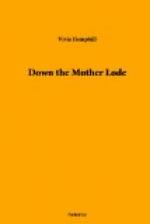The river was known to rise from 20 to 60 feet in 24 hours, in its narrow and precipitous walls.
At flood time, then, we often went down to the river through the orchard of big old cherry trees planted by my grandfather, to watch the mass of wreckage rushing by. Great logs would go down end over end; mining machinery caught in the limbs of uprooted trees; quantities of lumber, and once a miner’s bunk with sodden gray blanket and a wet and frantic squirrel upon it. I worried for days over the fate of that squirrel.
They tell the story of a Chinaman floating down upon a log.
“Hello, John, where you go?” was shouted. John shook his head, sadly.
“Me no sabe! Maybe Saclimento — maybe San Flancisco. No got time talkee, now.”
* * * * *
“Look, the water is up to the top of the old stone pier,” said one of the others.
“Mammy Kate’s ‘ghost’ would have a hard time haunting it now,” I laughed. “He’d be under twenty feet of water.”
“What ghost?”
“Why, the tollkeeper’s, of the old bridge. The one who hated the Indians so.”
“The Bear River tribe?”
“They were Diggers, but I think that nobody knew exactly which ones were guilty. It was a fine bridge, the first suspension bridge in Placer county.”
“It was washed away in the floods during the winter of ’61 and ’62, wasn’t it?”
“Yes and they built the new one a mile up the river at Rattlesnake Bar, where it still hangs.”
“What about the tollkeeper?”
Here is the story — with a bit of a prologue.
* * * * *
Captain Ezekiel Merritt, one of the “Bear Flag” party in Sonoma, came in ’49 to try his luck at mining on the Middle Fork of the American. His party came at last, through a deep canyon to a large bar on which they found among unmistakable evidences of a plundered camp both white man’s and Indian’s hair. A great ash heap containing calcined bones was undoubtedly the funeral pyre of white men and red men alike, and some yelling savages upon the upper bluff confirmed the tragedy which Captain Merritt’s party had been too late to avert.
They drove the Indians away and Captain Merritt cut into the bark of an alder the name “Murderer’s Bar,” by which the place has been called ever since.
The Merritt party stayed to work the bar. Before the summer passed the river swarmed with men, some of whom joined forces to make up mining companies. One of the rules of such a company: “Any shareholder getting drunk during the time he should be on duty, shall pay into the common treasury of the company a fine of one ounce of gold dust and shall forfeit all dividends during such time.” These fines, in some instances, became so frequent as to cause a total disruption of the company.
The Indians returned to their villages in the hills. The foothill Indians were not a particularly intelligent lot. They were Diggers, so named on account of their habits of digging in the ground for roots, and the larva of various insects for food. Eggs of ants, and the maggots found in wasp’s nests were considered great delicacies.




